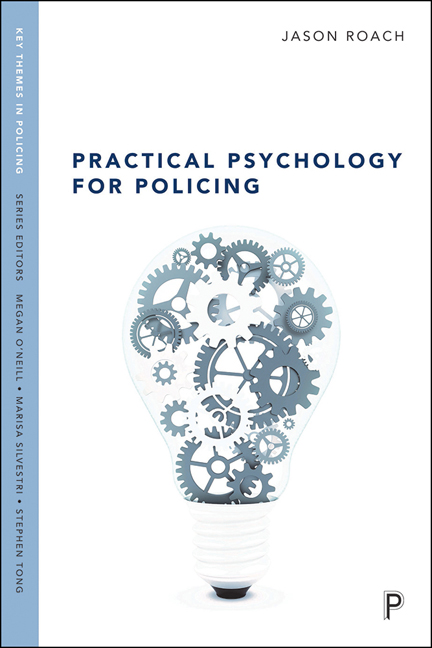Book contents
- Frontmatter
- Dedication
- Contents
- Series preface
- List of figures, tables, and boxes
- Acknowledgements
- 1 Introduction (or unleashing the kraken)
- 2 Psychology and policing: welcome bedfellows?
- 3 Human and police decision-making
- 4 Challenging common police perceptions of career criminals and serious offenders
- 5 Self-Selection Policing
- 6 Psychology, expertise, and improving police officer street-craft
- 7 Psychology and crime prevention
- 8 Psychology and police wellbeing
- 9 Psychology and policing: taking stock and where do we go from here?
- Notes
- References
- Index
2 - Psychology and policing: welcome bedfellows?
Published online by Cambridge University Press: 17 January 2024
- Frontmatter
- Dedication
- Contents
- Series preface
- List of figures, tables, and boxes
- Acknowledgements
- 1 Introduction (or unleashing the kraken)
- 2 Psychology and policing: welcome bedfellows?
- 3 Human and police decision-making
- 4 Challenging common police perceptions of career criminals and serious offenders
- 5 Self-Selection Policing
- 6 Psychology, expertise, and improving police officer street-craft
- 7 Psychology and crime prevention
- 8 Psychology and police wellbeing
- 9 Psychology and policing: taking stock and where do we go from here?
- Notes
- References
- Index
Summary
Introduction The purpose of this chapter is twofold: first, to demonstrate how psychological research and knowledge have contributed to the practice of policing (and vice versa) over the past few decades, by highlighting several areas where famously the relationship between psychology and specific aspects of policing has been most noticeable, and second, to provide a little introductory psychology for those readers not au fait with some of the psychological research and knowledge which has been applied in policing. Please don't feel that you will be at disadvantage – you won't be!
As this book is not about teaching police officers about psychology per se, this chapter will only present that psychological research (deemed by me) to be most relevant to and in policing, with only enough necessary psychological knowledge provided to enable readers to grasp the ways in which it has influenced policing and to provide a broader context from which to understand the remainder of the book. That said, we start at the beginning with science and crime or crime science.
Science and crime (or crime science)
‘Crime science is the application of scientific methods and knowledge from many disciplines to the development of practical and ethical ways to reduce crime and increase security’ (Wortley, Sidebottom, Tilley, and Laycock, 2019, p 2).
To the uninformed, disinterested, or both, the definition of crime science, provided by several of its principal architects, may echo that given for ‘criminology’, but for some of those in the know there are several albeit subtle, yet significant, differences. First, crime scientists claim that criminology is actually not about crime at all, as it has a much broader remit on why people commit crime, the characteristics of offenders, the structure of the society in which crimes are committed, the formation and administration of the law, the function of the criminal justice system, and so on, and not on crime itself (Wortley et al, 2019). One does not need to look far for evidence to support such a claim; take a look at the content of a criminology degree provided by any UK university, and you will see that much of the content is not really about crime, but about power, law-making, and how to best to deal with and reform those that transgress it.
- Type
- Chapter
- Information
- Practical Psychology for Policing , pp. 10 - 27Publisher: Bristol University PressPrint publication year: 2023

